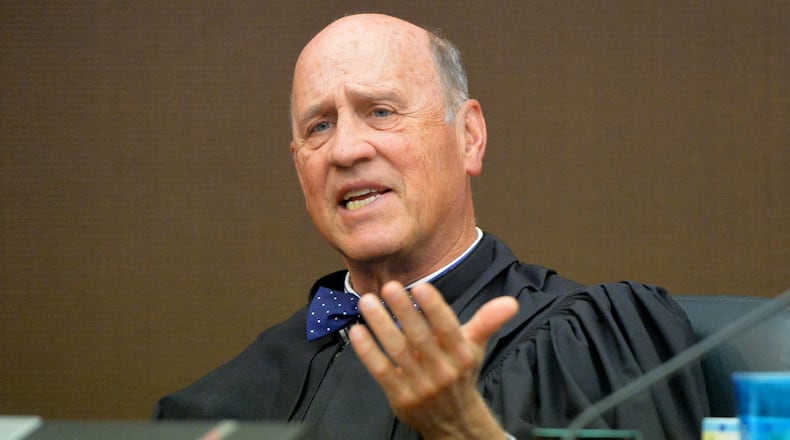Key ruling on prior restraint
Writing for the majority in Nebraska Press Association v. Stuart (1976), Chief Justice Warren Burger said:
“The thread running through all these cases is that prior restraints on speech and publication are the most serious and the least tolerable infringement on First Amendment rights. A criminal penalty or a judgment in a defamation case is subject to the whole panoply of protections afforded by deferring the impact of the judgment until all avenues of appellate review have been exhausted. Only after judgment has become final, correct or otherwise, does the law’s sanction become fully operative.
“A prior restraint, by contrast and by definition, has an immediate and irreversible sanction. If it can be said that a threat of criminal or civil sanctions after publication “chills” speech, prior restraint “freezes” it at least for the time.
Superior Court Judge Jerry Baxter issued his ruling before news media lawyers made their arguments, saying he realized the order he signed Friday was in error.
District Attorney Paul Howard had asked Baxter on Friday to restrain Fox 5 Atlanta and other news media from airing a story about the threat. Lawyers for Fox 5 and The Atlanta Journal-Constitution were present at the hastily called hearing before the start of testimony.
In an interview on Saturday, Reginal Dukes, a private investigator who previously testified at the trial, said he had received an anonymous threat about his testimony.
"There was a threat. I don't think there's anything to it, but you just don't know. It's being investigated. The District Attorney's Office is looking into it because I'm a witness."
The order, signed late Friday afternoon by Fulton County Superior Court Judge Jerry Baxter, “restrained and enjoined” the media, particularly TV station Fox 5 Atlanta, from airing “a certain news story.” It granted a request filed earlier in the day by Howard, who asked the court to ensure that “the jurors are not exposed to this news story.”
The AJC confirmed the story but elected not to publish it, in light of the judge's order.
Baxter’s order was example of “prior restraint,” in which a judge orders a news outlet not to publish certain information. Higher courts have generally ruled that prior restraint is an unconstitutional violation of the First Amendment; if it were permissible, courts could bar the media from publishing any information that was objectionable to the government, business interests or anyone else who asked the court to intervene.
“The freedom to publish is one of the legal pillars of our democratic system,” Tom Clyde, attorney for The Atlanta Journal-Constitution, said. “It’s troubling that the DA’s motion did not alert the court that it was asking for an order that is unconstitutional. We are optimistic the court will lift the order when it gets a full explanation of the law.”
Howard, the district attorney, also declined to comment on Sunday.
'Public interest in the integrity of this trial'
In his motion, the DA said he was concerned that airing the story could taint the jury and “cause immediate and irreparable harm.”
“The public interest in the integrity of this trial, and ensuring that the jurors are not exposed to this news story, outweighs any interest in airing this story prior to a show-cause hearing,” the motion said. In a show-cause hearing, the state must demonstrate why Baxter’s restraining order should remain in place.
Howard noted that jurors hearing testimony in the trial are not sequestered, meaning they can go about their lives at the conclusion of a day’s testimony instead of being confined in a hotel until the trial is over.
For this reason, Baxter has repeatedly instructed the jurors not to read, watch or listen to any news coverage of the test-cheating case.
Dallas attorney Tom Leatherbury, who specializes in media law and has represented the CBS program “60 Minutes,” said he can see the dilemma Baxter is in: a trial that has already taken months to get to this point, a jury that’s not sequestered and many more witnesses still expected to testify.
“You do have understanding with what he’s having to deal with,” Leatherbury said. “But I think there are definitely constitutional problems with the order and the procedure used to enter it. … If there was no violation of any court order, then I think absent really, really, really extraordinary circumstances, the TV station and other media have the right to publish the story.”
Constitutional scholars contacted by the AJC tended to agree.
Prior restraints 'are incredibly disfavored'
University of Georgia law professor Sonja West, who teaches constitutional and media law, said from a First Amendment standpoint, Baxter’s order is “concerning.”
“In a series of cases, the U.S. Supreme Court has said it’s unconstitutional to punish the press for publishing truthful information about a matter of public concern that was obtained legally,” she said. “All of that seems to be satisfied here.”
The high court has said there must be a showing of a “government interest of the highest order to satisfy prior restraint,” she said. The court has also ruled that even imposing a delay can be unconstitutional because it prevents the news organization from publishing its information in a timely manner, West said.
Eric Segall, a constitutional law professor at Georgia State University, said prior restraints against the news media “are incredibly disfavored.”
“Prior restraints should only be granted in the most extreme circumstances,” he said. “There would have to be an incredibly strong showing of a threat to the rule of law.”
If Baxter ultimately lifts his restraining order, Segall added, “I hope the media act responsibly on their own.”
About the Author
Keep Reading
The Latest
Featured



